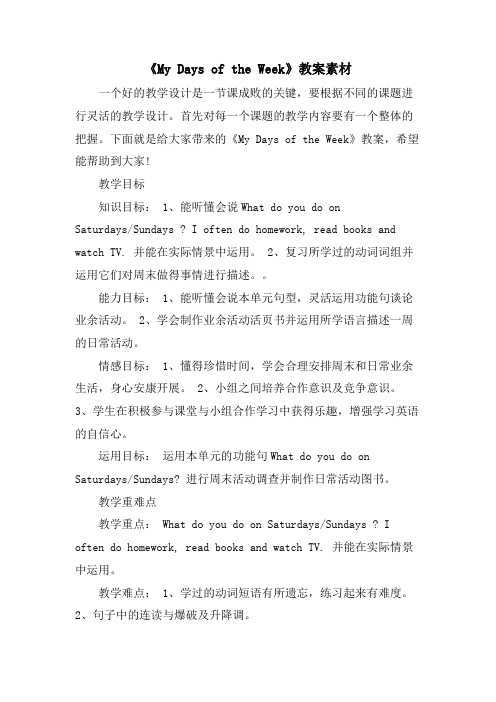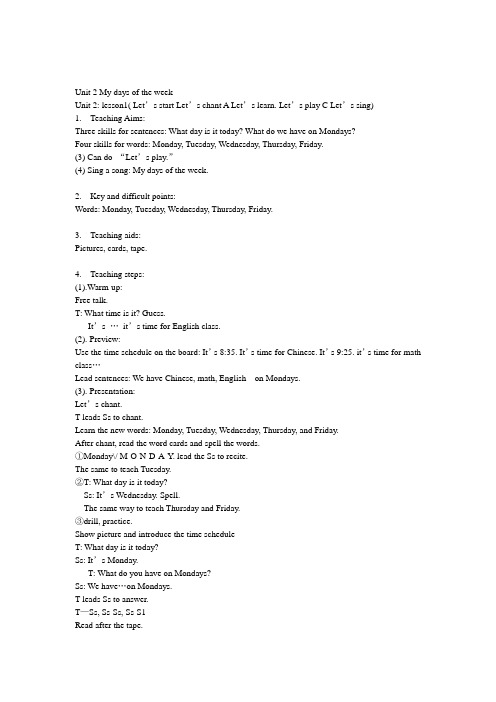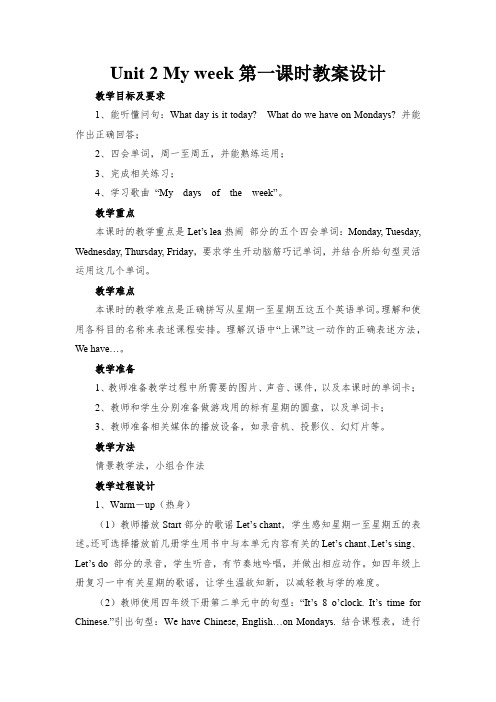Unit 2 My Days of the week教案
人教课标版小学英语五年级上Unit-2-My-Days-of-the-Week

Saturday Sat. 星期六
Does
often sleep at
home on Saturdays?
Yes, he does./ No,he doesn’t.
懒洋洋星期六经常在家睡觉吗?
What dose Lan Yanyan do on Saturdays?
游戏:屏幕上会出现很多的单词,短语 和句子,一定时间后部分单词,短语或 句子会消失,这时,如果你能拼出这些 单词,短语或句子,请马上举手,最多 人举手的小组来拼出单词,短语或句子, 拼对的小组可以获得加分。
复习 Unit 1
My Days Of The Week
Section A
• Monday, Monday, math on Monday. • Tuesday, Tuesday, art on Tuesday! • Wednesday, Wednesday,
computers on Wednesday. • Thursday, Thursday, P.E. on Thursday. • Friday, Friday, my favourite day!
Math
10:40 Music Art
Computer
Moral P.E. Educatio n
看图回答问题:
1.What day is it today? It’s Tuesday .
2.What do we have on Tuesdays ?
We have Math English Computer Art.
cook the meals
play ping-pong
sing
What do you do on Sundays?
Unit 2 My days of the week A Let’s learn (1)

Unit 2 My days of the week A Let’s learn (1)1. 我能够听、说、读、写单词:Monday, Tuesday, Wednesday, Thursday, Friday,并能根据实际情况替换句型熟练运用。
2. 我能听懂、会说:What day is it today? It's .... What do you have on ... ? Wehave .... I like .... 并能在情景中熟练运用,做出正确回答。
二、知识链接1. 表示星期几的七个单词,开头第一个字母都要大写。
How many days are there ina week? There are 7.一个星期有几天?七天。
Weekend周末(包括周六和周日)2. on+星期。
如on Monday, on Sunday .表示在几点几分,在具体时间时,用at. 如at 6:30.第一关:打开英语书翻到第16页,听录音标序号。
(写阿拉伯数字)第二关:组长组织群读两遍后对子读,不会的在小组内学习交流,并在导学案的评价栏中作出评价(打√)。
最后组长要组织组员去预展。
(用自己喜欢的方式去读,看哪组最有创意!)第三关:展示(I can show):同学们,请展示你们的学习成果吧,让大家共同分享!(1). 集体展示。
(2). 请个别学生展示。
第四关:1、选出下列单词的汉语意思并把单词认真的抄写一遍。
(1) Monday _______ (2) Friday ________ (3) Thursday _______ (4) Tuesday _________ (5) Wednesday _______ 2、一周七天,写出缺少的那几天。
Sunday → Monday → →→ → → Saturday自我简评Homework(作业):1、读熟P16的Let ’s learn 和P17的Let ’s talk ,下节上课前到组长处打“√”。
《My Days of the Week》教案素材

《My Days of the Week》教案素材一个好的教学设计是一节课成败的关键,要根据不同的课题进行灵活的教学设计。
首先对每一个课题的教学内容要有一个整体的把握。
下面就是给大家带来的《My Days of the Week》教案,希望能帮助到大家!教学目标知识目标: 1、能听懂会说What do you do onSaturdays/Sundays ? I often do homework, read books and watch TV. 并能在实际情景中运用。
2、复习所学过的动词词组并运用它们对周末做得事情进行描述。
能力目标: 1、能听懂会说本单元句型,灵活运用功能句谈论业余活动。
2、学会制作业余活动活页书并运用所学语言描述一周的日常活动。
情感目标: 1、懂得珍惜时间,学会合理安排周末和日常业余生活,身心安康开展。
2、小组之间培养合作意识及竞争意识。
3、学生在积极参与课堂与小组合作学习中获得乐趣,增强学习英语的自信心。
运用目标:运用本单元的功能句What do you do on Saturdays/Sundays? 进行周末活动调查并制作日常活动图书。
教学重难点教学重点: What do you do on Saturdays/Sundays ? I often do homework, read books and watch TV. 并能在实际情景中运用。
教学难点: 1、学过的动词短语有所遗忘,练习起来有难度。
2、句子中的连读与爆破及升降调。
教学过程Step 1 Warm-up and review.Greetings: T: Hello, boys and girls. How are you today? Ss:--- T:What day is it today? What do you have on ---?Do you like ---? Why ?(Free talk between T and Ss) What day is tomorrow? (Saturday)Do you like Saturdays? What do you often do on Saturdays and Sundays?Guessing game任意学生自由做动作,让其他同学快速说英语。
《Unit 2 My Days of the Week Part B let’s learn》教学

《Unit 2 My Days of the Week Part B let’slearn》教学反思《Unit 2 My Days of the Week Part B let’s learn》教学反思本节课我讲的是其次单元"My Days of the Week'Part B的lets learn。
主要内容是讲授两个单词Sunday, Saturday;三个短语do homeork, atch TV, read books;两个句子What do you do on Saturdays?I often do my homeork.看似内容并不太难,由于单词不多,短语有些孩子已经会说,只是句子有点难度。
原来课时要求就是只要求孩子把握单词和短语,句子只要求听懂不要求都会说。
但是我认为对于四班级的孩子来说一节课的单词太少,这个要求就有点低了,所以备课时我预备把句子的练习也设计进去。
看似不难的课要讲出彩却并不那么简单。
板块太碎了不太简单设计活动,而且由单词转入短语,由短语转入句子之间的连接怎样既自然又不铺张时间难住了我。
由于在A部分我们已经学习过了周一到周五这几个单词,我就想着利用旧学问引出新学问周六和周日两个单词。
但是直接复习引出没有新意,也不宜激起同学的学习兴趣。
所以我采纳应用一首关于星期的歌曲,首先吸引同学的留意力,用歌曲中提到的两个介词before 和after 复习周一到周五五个单词,并顺势引出Sunday, Saturday。
在转入短语学习时,我利用本课问句What do you do on Saturdays?引出这些短语。
把自己设计成CCTV记者,采访同学。
让同学自己说出一些知道的短语。
然后告知同学自己也采访了(自己预备好的课件)某学校同学明明。
效仿明明回答I often do my homeork, read books and atch TV.然后出示这几个短语,进行拍手chant练习。
五年级下册英语第二单元全英文备课

Unit 2 My days of the weekUnit 2: lesson1( Let’s start Let’s chant A Let’s learn. Let’s play C Let’s sing)1. Teaching Aims:Three skills for sentences: What day is it today? What do we have on Mondays?Four skills for words: Monday, Tuesday, Wednesday, Thursday, Friday.(3) Can do “Let’s play.”(4) Sing a song: My days of the week.2. Key and difficult points:Words: Monday, Tuesday, Wednesday, Thursday, Friday.3. Teaching aids:Pictures, cards, tape.4. Teaching steps:(1).Warm-up:Free talk.T: What time is it? Guess.It’s …it’s time for English class.(2). Preview:Use the time schedule on the board: It’s 8:35. It’s time for Chinese. It’s 9:25. it’s time for math class…Lead sentences: We have Chinese, math, English---on Mondays.(3). Presentation:Let’s chant.T leads Ss to chant.Learn the new words: Monday, Tuesday, Wednesday, Thursday, and Friday.After chant, read the word cards and spell the words.①Monday\/ M-O-N-D-A-Y. lead the Ss to recite.The same to teach Tuesday.②T: What day is it today?Ss: It’s Wednesday. Spell.The same way to teach Thursday and Friday.③drill, practice.Show picture and introduce the time scheduleT: What day is it today?Ss: It’s Monday.T: What do you have on Mondays?Ss: We have…on Mondays.T leads Ss to answer.T—Ss, Ss-Ss, Ss-S1Read after the tape.Sing a song.T write the new words and Ss write after T and find the rule of writing and remembering these words.(4). Consolidation and extension:Do the listening exercise in Activity book. P9 (1), (2)T explains the exercise, listen and match, finish the sentences.b. Write the new words four times and recite them.c. Ss book P18: Design a time schedule and show them in the class.Teaching notes:Unit2 Lesson 2(A Let’s try. Let’s talk. Group work. C Good to know.)1. Teaching Aims:Two skills for sentences: What day is it today? It’s---What do you have on---? We have---.I like---and can talk with each other.Good to know.2. Key and difficult points:(1) Three skills for sentences: What day is it today? It’s---What do you have on---? We have---.I like---. Can talk with each other use sentences have learnt.(2) Let’s try.3. Teaching aids:Pictures, cards, tape, calendar.4. Teaching steps:(1). Warm-up:Sing a song: My days of the week.Free talk.T: What day is it today?Ss: It’s Wednesday.Spell.What do you have on Wednesdays?I have Chinese, math….on Wednesdays.T uses the schedule to lead the students answer this questions.(2). Preview:a. Review the new words. Read and spell.b. Do: Let’s try.Instruct the Ss to do the exercise.(3). Presentation:Ss read the text first and think about two questions:What day is it today? What classes should Amy learn this day?Answer the questions:Ss: It’s Wednesday. Amy has English, science, computer and P.E. on Wednesdays.T: Does she like Wednesdays?Ss: Yes, she like Wednesdays.T: Do you like Wednesdays? Why?Ss: Yes, I like Wednesdays. Because we have…/ No, I don’t like Wednesdays.Read after the tape.T-Ss, Ss-Ss, recite.Show the picture, T-Ss, Ss-Ss, Ss-S1 ask and answer.Group workSs book P18 we have write down the time schedule. Please look at it, let’s ask and answer. T: what do you have on ….?Do you like ….? Why?I like….because we have …on….Ss say to the partners.Activity book P10Fill in the blank and read.Good to know.Mother’s Day, Father’s Day and Thanksgiving day.(4).Consolidation and extension:a. Do the listening exercise in Activity book. P10 (3)T explains the exercise, listen and write the number.b. Read to your partners, and design a new time schedule.Teaching notes:Unit2 lesson3( A Read and write. Pair work. C Pronunciation)1. Teaching Aims:(1) Can know the meaning of the story.(2) Four skills for sentences.(3) Pronunciation.2. Key and difficult points:Four skilled sentences and pronunciation.3. Teaching aids:Pictures, cards, tape.4. Teaching steps:(1).Warm-up:Let’s chant.Sing a song: My days of the week.Free talk.T: What day is it today/tomorrow?What do you have on…?Which day do you like?(2). Preview:Spell words.(3). Presentation:Read and writeT show picture and ask: It’s time to go bed. Mike puts away his textbooks. But he puts wrong books in his schoolbag. Why?Read the dialogue by students. Lead Ss to find the answer quicklyListen to the tape, sentences by sentence.T asks questions.T: what day is it today?What dose Mike have on Wednesdays?What day is it tomorrow?What dose he have tomorrow?Read together after T, check the answer.Write the sentences after T.Pronunciation.(4). Consolidation and extension:a. Pair work: ask and answer in pairs. What do you have on…?b. Activity book P11, P15 explains the exercise.c. Write the sentences four times.Teaching notes:Unit2 lesson4(B Let’s learn. Let’s chant C Story time.)1. Teaching aims:Can do: Let’s chant.Four skills for words: Saturday, Sunday. Can say phrases: do homework, watch TV, read books. Story time.2. Key and difficult points:(1) Words: Saturday, Sunday. phrases: do homework, watch TV, read books.3. Teaching aids:Pictures, cards, tape.4. Teaching steps:(1). Warm-up:Let’s chant.(P14)(2). Preview: Pass the sentencesT: What do you have on Mondays?S1: We have…on Mondays. What do you have on Tuesdays?S2: We have…on Tuesdays…..S3:(3). Presentation:You have many classes on Monday, Tuesday, Wednesday, Thursday and Friday. These are weekdays. But we have the other two days. They’re Saturday and Sunday.Read and spell Saturday and Sunday. They’re weekends.What do you do on Saturdays and Sundays? Let’s chant (P19)Act what do they do on weekends. Guess.Lead to phrase: do homework, watch TV, read books.Read after the tape and practise the sentences.Let’s chant.T act the other actions: play football, play basketball, play the violin, play the piano, paint, play computer games, listen to music…Ask and answer: what do you do on…? I ….on …T-Ss Ss-Ss Ss-S1Ss write the new words after T.Story timeT put up the picture, Ss read first, and listen to the tape, read after the tape and T, act the story.(4). Consolidation and extension:Activity book P12(1) listen and match.(2)finish the sentences.With the T’s instruction.Write the new words four times.Write different chants.Teaching notes:Unit2 lesson5( B Let’s try. Let’s talk. Pair work. C .Let’s check.)1. Teaching aims:Two skills for sentences: What do you do on Saturdays/Sundays? I often do homework, read books and watch TV.Can do “Let check.”2. Key and difficult points:(1) Three skills for sentences: What do you do on Saturdays/Sundays? I often do homework, read books and watch TV. Can talk with each other use sentences have learnt.3. Teaching aids:Pictures, cards, tape.4. Teaching steps:(1).Warm-up:a. Let’s chant.Free talk.T: what day is it today?What do you have on…?(2). Preview:On weekdays, we study hard. On Saturdays and Sundays we can do other things and have good rest. What do you do on Saturdays and Sundays?Review the words and sentences have learnt.(3). Presentation:Let’s try.Listen and circle.Let’s talk.Read by the students first.Ask and answer: What does ChenJie do on Saturdays/Sundays?Read after tape sentence by sentence.Read: T-Ss Sb-Sg Ss-S1Pair work.Use more phrases, let the students ask and answer in pairs.T: What do you do on…?Do sports: play football, play basketball, go swimming, go fishing, go to the park…Listen to music, play the violin, play the piano…paint, play computer games, do some shopping.Let’s check.4. Consolidation and extension:a. Activity book P13(1) listen and match.(2)read and circle YES or NO.b. Arrange your weekends reasonable.Activity book P14(5)Teaching notes:Unit2 lesson 6 (B. Read and write. Group work. C Task time.)1. Teaching aims:(1) Can know the meaning of the story.Four skills for sentences.Task time.2. Key and difficult points:Four skilled sentences and task time.3. Teaching aids:Pictures, cards, tape.4. Teaching steps:(1).Warm-up:New chant (make by Ss)(2). Preview:a. Spell the words and phrases.b. Group work: what do you do on…?c. Check the Activity book P14(3). Presentation:Ss read the text and answer the question using the sentences.Listen to the tape. Answer the questions:Zoom and his aunt Cathy are talking about his weekend, now listen and answer my questions. What time is it?What day is it today?What does Zoom do on Saturday?Which is the best?Does he like Saturdays?Aunt Cathy also has her homework, what’s this?Read after the tape. Read together, check the answer.Write the sentences with T’s instructor.Group work.T asks one student: what do you do on…?Then say I can play with you! And write down the student’s name.Work in the groups.Task time.Tell the Ss the request, and ask them to do this excites after class.(4). Consolidation and extension: Check the Activity book P14 (5) Write the sentences.Teaching notes:。
Unit 2 My week第一课时教案设计-小学《英语》五年级上册-人教PEP版

Unit 2 My week第一课时教案设计教学目标及要求1、能听懂问句:What day is it today? What do we have on Mondays? 并能作出正确回答;2、四会单词,周一至周五,并能熟练运用;3、完成相关练习;4、学习歌曲“My days of the week”。
教学重点本课时的教学重点是Let’s lea热闹部分的五个四会单词:Monday, Tuesday, Wednesday, Thursday, Friday,要求学生开动脑筋巧记单词,并结合所给句型灵活运用这几个单词。
教学难点本课时的教学难点是正确拼写从星期一至星期五这五个英语单词。
理解和使用各科目的名称来表述课程安排。
理解汉语中“上课”这一动作的正确表述方法,We have…。
教学准备1、教师准备教学过程中所需要的图片、声音、课件,以及本课时的单词卡;2、教师和学生分别准备做游戏用的标有星期的圆盘,以及单词卡;3、教师准备相关媒体的播放设备,如录音机、投影仪、幻灯片等。
教学方法情景教学法,小组合作法教学过程设计1、Warm-up(热身)(1)教师播放Start部分的歌谣Let’s chant,学生感知星期一至星期五的表述。
还可选择播放前几册学生用书中与本单元内容有关的Let’s chant、Let’s sing、Let’s do 部分的录音,学生听音,有节奏地吟唱,并做出相应动作。
如四年级上册复习一中有关星期的歌谣,让学生温故知新,以减轻教与学的难度。
(2)教师使用四年级下册第二单元中的句型:“It’s 8 o’clock. It’s time for Chinese.”引出句型:We have Chinese, English…on Mondays. 结合课程表,进行日常口语练习,内容可参考如下:A: Hello, B. What time is it?B: Hello, A. It’s 8:20. It’s time for English class.2、Presentation(新课呈现)(1)教师结合Let’s start 的图片和情景,提问:“What classes do you like?”引导学生复习有关课程的词汇。
daysoftheweek教案.doc
daysoftheweek 教案【篇一:the days of the week 教学案例】蔡店小学阮君一、教材分析本节课是学习join in 小学三年级英语下册第二单元the days ofthe week 的part 8 部分,主要内容是复习认读有关一周七天的单词,另外掌握句型what’s your favourite ......?my favourite ......is ...... . 并完成教材第八部分的练习。
1. 教学目标:(1)、学生能听、说、认、读一周的星期单词。
(2)、学生能够听、说句子:what’s your favourite ......?my favourite ...... is...... . 并能用这些句子进行交流。
(3)、学生能用所学句型及知识进行简单的自我介绍。
2.教学重难点:学生能够听、说句子:what’s your favourite ......?my favourite ...... is...... . 并能用这些句子进行交流。
二、学情分析本节课授课的对象是小学三年级的学生,他们对英语有一定的了解,在学习这节课之前,他们已初步掌握了关于动物、颜色、数字、食物、星期等单词,他们对英语的学习有着极高的兴致,模仿能力也很强。
三、教学设计一、warming up1. say the chant alltogether.2. look and read the words.3. a guessing game: what day is it ?二、presentation step 1t points her coat,asks: what colour is it ? ss answer.t says: ilike green very much.my favourite colour is green.show the new word :favouriteand sentence: my favourite colour is green.step 2 drills1. read the word.2. read the sentence.step 3t says: my favourite colour is green.t hen asks: what ’s your favourite colour?show the senten on the board.step 4 drills1. t reads, ss read.2. read it one by one . step 5t shows a card, ss read the colour word.then use the word to say the sentence:my favourite colour is __________.step 6coninue in this way to show the other questions:1. what ’s your favourite day?2. what ’s your favourite number?3. what ’s your favorite pet?4. what ’s your favourite food?step 7use the word card to answer the questions:my favourite _______is_________.1. t asks, ss answer.2. work in pairs.3. ask and answer in class.三、do the exercise step 1open the books turn to page 17. ss look at part 8, read and complete the sentences.step 2check the answers.ss read the sentences out.四、practice introduceyourselfh ello, i ’m ________.my favourite day is________.my favourite food is________.my favourite colour is_______.my favourite pet is__________.my favourite number is______.五、homeworkwrite about yourself.四、教学反思本堂课的重点是学习有关星期的词汇及句型what’s yourfavourite day ? my favourite day is .... 的认读及掌握,在设计整堂课的教学时,我是这样做的:1.本课时话题的功能性强,在学习了星期单词及句型后what’s your favourite day ? my favourite day is .... . 之后,教师先给学生做一个示范,并逐步由教师与学生之间的问答过渡到生生问答,最终将不同类别的句子归纳起来,进行一个简短的自我介绍。
Unit 2 My days of the week A Read and write and Pronunciation(2)
Unit 2 My days of the week A Read and write (2)1、我能读懂对话并能听说读写Read and write中加粗的单词和句子。
2、我会熟练的表演对话。
知识链接1. 表示星期几的七个单词,开头第一个字母都要大写。
How many days are there ina week? There are 7.一个星期有几天?七天。
Weekend周末(包括周六和周日)2. on+星期。
如on Monday, on Sunday .表示在几点几分,在具体时间时,用at. 如at 6:30.第一关:组长组织群读P18 Read and write两遍后对子读,不会的在小组内学习交流,并在导学案的评价栏中作出评价(打√)。
最后组长要组织组员去预展。
(用自己喜欢的方式去读,看第二关:展示(I can show):同学们,请展示你们的学习成果吧,让大家共同分享!第三关:完成read and write中的练习(Finish the sentences)。
1、独立完成。
2、组内讨论交流。
第四关:Listen and repeat. (学习P11中的Pronunciation.)第五关:达标测评。
1、请用书写体抄写下列句子。
What day is it today? It’ Wednesday.What do you have on Thursdays?2、从B栏中找出A栏的答语。
A B( )1.What do you have on Mondays? A. That’s right!( )2.What day is it today? B. Great! I can play with you.( )3.What do you do on Sundays? C. I have English and art on Mondays. ( )4.I often play football. D. It’s Monday.( )5.I do my homework on Saturdays. E.I do my homework at home on Sundays.自我简评Homework(作业):1、读熟P18的Read and write和P23的Pronunciation,下节上课前到组长处打“√”。
五年级英语二单元
We have… I like…
教学叙事:
2013年9月26日 第四周星期四(第五节)总第10课时
课题
Unit2 My days of the week课型Fra bibliotek新授课
教
学
目
标
知识目标:
Be able to understand and use the sentences in “Read and write”.
情感目标:
Let Ss like English.
教 学
重 点
mportant points: What day is it today? It’s … What do you have on Wednesday? We have English, science, computer and P.E.
It’s 8:50.
What day is it?–(引出新单词和句型)—MondayWe have …on Mondays.(还可设置问题:What day is it today? What day do you like?)
复习有关课程的词
Read the new words: Listen to the tape, Ss read after the tape.
Write the four-skills words汇,
复习有关课程词汇,感知本单元的主要语言激发学生的兴趣。
板书设计:
Unit2 My days of the week
MondayTuesdayWednesdayFriday.
教学叙事:
小学五年级上册英语第二单元《 My Days of the Week》说课稿范文
小学五年级上册英语第二单元《 My Days of the Week》说课稿范文一、说教材1、教材内容今天我说课的内容是PEP Primary English Book 5中的 Unit 2 My Daysof the Week第五课时,主要学习What do you do on Saturdays / weekends?I often do homework,read books and watch TV.本节课的主要内容是要求学生能讲述自己在周末的活动以及学会询问朋友在周末的活动安排。
2、教材的地位《英语课程标准》中把“激发和培养学生学习英语的兴趣”放在英语教学的首位,在小学英语启蒙教学中教师尤其要关注这一点。
那么如何使学生对英语的学习具有浓厚的兴趣呢?最关键的一点就是学习内容应该和学生的实际息息相关,尽可能地贴近他们的生活。
本节课的教学内容是学生真实生活的反映,学生学习之后,可以开展“了解朋友周末生活”为主题的调查活动。
这种活动能使学生在较真实的语境中锻炼语言交际能力,从而发展他们的语言思维能力,同时也能进一步培养学生之间的合作精神。
二、说目标1、教学目标根据教材的内容和学生的年龄特征及认知水平确定以下目标:知识目标:能听懂、会说: What do you do on Saturdays/weekends? Ioften do homework, read books and watch TV. 并能在情景中运用。
能力目标:在知识目标的基础上,要求学生在实际生活中会用英语来谈论学习和生活,从而提高他们综合运用语言的能力。
情感目标:让学生通过运用语言来完成学习任务,感受成功,从而引发和培养学生学习英语的内在动机,最终使他们形成英语学习的积极态度。
2、教学重、难点本课时的重点是掌握句型:What do you do on Saturdays/weekends? Ioften do homework, read books and watch TV. 并能在真实情景中运用。
- 1、下载文档前请自行甄别文档内容的完整性,平台不提供额外的编辑、内容补充、找答案等附加服务。
- 2、"仅部分预览"的文档,不可在线预览部分如存在完整性等问题,可反馈申请退款(可完整预览的文档不适用该条件!)。
- 3、如文档侵犯您的权益,请联系客服反馈,我们会尽快为您处理(人工客服工作时间:9:00-18:30)。
五年级上册Unit 2 My Days of the week 第四课时教学设计一、教材分析本节课的教学内容是PEP五年级上册第二单元的第四课时:Part B Let's learn & Let's chant,主要学习词汇Saturday, Sunday, do homework, watch TV, read books,和句子What do you do on Saturdays / Sundays?I often ,,, 学生能讲述自己在周末的活动以及学会询问朋友在周末的活动安排。
《英语课程标准》中把“激发和培养学生学习英语的兴趣”放在英语教学的首位,在小学英语启蒙教学中教师尤其要关注这一点。
那么如何使学生对英语的学习具有情趣性呢?最关键的一点就是学习内容应该和学生的生活实际息息相关,尽可能地贴近他们的生活。
本节课的教学内容是学生真实生活的反映,学生学习之后,可以开展“了解朋友周末生活”为主题的调查活动。
这种活动能使学生在较真实的语境中锻炼语言交际能力,从而发展他们的语言思维能力,同时也能进一步培养学生之间的合作精神。
二、学生分析五年级的学生学习英语已经有两年的时间了,学习了一些英语动词的表达方法,如play baseball, play ping pong, watch TV, have a sleep ...学生在本单元的第一课时已经学习了从星期一到星期五的单词。
对于do homework, watch TV, read books三词,学生在以往的教材中接触过,能够听说认读,但是在这节课要求学生能够写。
但是关于often, sweet等词,学生还没有接触。
三、教学目标1、听懂会吟唱歌谣。
2、能够听、说、读、写Saturday, Sunday两个单词和do homework, watch TV, read books三个短语,并能结合所给句型在实际情景中运用。
四、教学重难点第一部分的四会单词和短语:Saturday,Sunday,do homework,watch TV,read books。
联系实际,学生能结合所给句型和词语,在实际情景中熟练运用新单词和词组。
五、教学方法在课堂教学过程中,教师要始终把学生放在教学的主体,学生通过教师的适时引导、启发和点拨来完成学习活动,从而建构起自己新的知识结构体系,最终实现教学与学的最佳结合。
在教学过程中教师注意创设各种游戏活动和竞赛活动,给学生创设一个轻松愉快的语言学习氛围,从而使他们思维积极,创造潜能得以开发。
另外,课中还让学生来代替教师的角色,真正实现师生角色的互换,缩短了师生的情感距离,以达到良好的教学效果。
在学法指导上,重视多元智能教学理论、合作学习法和任务型语言学习法等应用。
六、教学准备 一个Zhang Peng的头像、一个转盘、图片和课件、小星星,彩色粉笔。
七、教学过程1. 导入设计①播放歌谣,营造气氛。
1.Warm-up(热身)(1)日常口语练习,内容可参考如下:Good afternoon! How are you?What’s your name?Nice to meet you!How old are you? What day is it today?(2)Sing the song:“My days of the week”.T: Today, a new friend came to our classroom. Look, Who is he?(随机出示张鹏的头像)S: He is Zhang Peng.T: Welcome Zhang Peng. Now ,let’s sing and dance together.【设计意图:教师播放本单元Let’s sing (“My days of the week”)部分的歌曲,师生载歌载舞,让学生熟悉本课时要学歌曲的单词和音乐节奏,轻轻松松进入英语学习课堂。
】②游戏活动,激发兴趣,引发思考。
T:(播放课件,秋天来了,树叶一片一片飘落,每片落叶上分别有星期一到星期五的单词。
)The fall is coming. The leaves are falling. Look! Can you read them?Ss: ...(学生看落叶,读单词。
)T: Please look carefully and find what's missing.(在课件中,五片落叶飘落一片,学生说落下的叶片是星期几。
)全班学生以抢答的形式,再次巩固和强化上节课的内容。
【设计意图:通过抢答游戏,让全体学生动起来,避免了机械单调的读,活跃了课堂气氛,激发了学生学习的兴趣,同时也锻炼了学生观察、记忆和快速反应的能力。
】2. 新课呈现①学习Saturday。
教师在载歌载舞后,(在课件中,落下星期五的落叶)问:What's the day after Friday? The day after Friday is Saturday. How to read Saturday? Let's have a look? 在课件中,先后出现cat, hamburger两词,词中的a和ur为红色。
在单词出现后,学生朗读,教师引导学生注意a和ur的发音。
在课件中,出现Saturday这个单词,其中a和ur为红色,学生试着自己读,教师校正,板书,学生跟读,用两种语调读。
【设计意图:培养学生学会读单词的能力,同时为Chant的读做好准备。
】T: How many Saturdays are there in September?(在课件中,出现2011年9月的日历,9月的星期六圈出来,学生看日历,回答问题。
)S1: ...T: What do you do on Saturdays?(教师板书句子,强调Saturday后面的s,学生跟读。
)Ss: What do you do on Saturdays?T: I often go shopping.(板书句子,教读often,强调o和t的发音。
)T: What do they do on Saturdays? Look!(通过课件播放9张图片:play ping pong, play basketball, play football, have a sleep, have a snack, watch TV, paint, play computer games, read books)出示图片,学生说活动词组。
T: What do you do on Saturdays?(教师指图片,问)S1: I often ...T: What do you do on Saturdays?(教师指图片,问)S2: I often ......Pair work. 展示,评价。
T: What does Zhang Peng do on Saturdays?播放课件,Zhang Peng do homework, read books, watch TV的图片,学生说,老师板书,强调元音字母的发音。
T: You are Zhang Peng. What do you do on Saturday, Zhang Peng?教师指图片,学生回答。
【设计意图:巩固新学动词词组。
】T: Do you want to know what Ms Fan does on Saturdays?Ss: Yes!T: You can ask me.Ss: What do you do on Saturdays, Ms Fan?T: Can you guess?S1: You often do housework.S2: You often watch TV....T: Look!(播放课件)What do I do on Saturdays? I often go hiking.(带读hiking)②学习Sunday。
T: The day after Saturday is Sunday. Look! What's this?Ss: Sun.T: How to read this word?(课件出现Sunday一词。
)Ss:学生一口气读准了。
T: How many Sundays are there in September?(课件出现2011年9月的日历,9月的星期日圈出来,学生看日历,回答问题。
)S1: ...T: What do you do on Sundays?S1: I often ...T: Good habits! / Well done! ...学生问,学生答,学生评价。
③学习weekend。
通过课件出示一朵花,7个花瓣分别是从星期一到星期天的单词。
教师指,学生读。
T: From Monday to Friday are school days. Saturday and Sunday are the weekend.(带读weekend,根据sweep的发音,强调ee的发音。
)通过课件出示教师的周末文章。
学生两人一组说一说自己的周末,班内展示。
④学习Chant。
通过课件出示Chant内容,学生自读,圈出新单词。
通过课件出示单词sleep, sweep, sweet,学生自己试读单词,教师校对,跟读。
另外,通过课件出示单词lollypop, candy, orange juice。
T: The lollypop is sweet. The candy is sweet. The orange juice is sweet. What's the meaning of the candy?S1:甜的。
学生听音,跟读,展示。
分师生读,男女读。
⑤欣赏歌曲。
利用课件播放Let's sing的歌曲。
学生听,跟唱。
3. 拓展延伸①转盘游戏T/S:What do you do on Saturdays/Sunday ?S: watch TV/do homework/read books.②设计周末一天的安排。
要求学生以表格形式填好活动内容与时间,然后在班中或小组内交流。
如I often get up at 7:30. I often have breakfast at 8:00. I often read books at 8: 00. I often do sports at 9:00, etc.【设计意图:课标明确规定,教学要重视从学生的日常生活出发,培养学生实际运用语言的能力。
因此,让学生结合生活实际来设计自己周末一天的生活安排,能使学生切实感到身边有英语,从而增强学生运用英语的意识,培养学生的自主创新能力。
